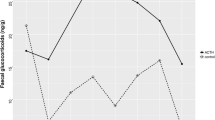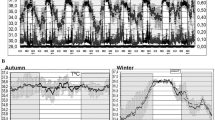Abstract
Captive primates require environmental enrichment to minimize physical and mental stress. However, only a few objective evaluations have been performed to assess environment-induced physiological variations in these animals. In this study, we evaluated the usage of the metabolic profile test (MPT) to assess the influences of the housing environment on the physiology of Japanese macaques. Five male macaques were housed in an old type of cage (old cage group), in which the macaques were exposed to wind (except for a shelter box), and four males were in a new -type of cage (new cage group), which had a sub-room with a waterer that was surrounded by insulating panels. Blood samples were collected bimonthly for a year from the two groups to determine the complete blood count and blood biochemistry. The increase in the body weight of the macaques in both groups was suppressed during the cold season. Furthermore, this suppression was more pronounced in the old cage group, suggesting that the energy expenditure was higher in the old cage group than in the new cage group. Moreover, the red blood cell count and hematocrit values were higher during the cold season in both cages than during the warm season, suggesting that macaques were dehydrated during the cold season. Dehydration tendency was more pronounced in the macaques from the old cage group than in those from the new cage group, suggesting that their water intake decreased during the cold season. Our results suggest that the MPT can be used to evaluate environment-induced physiological variations in Japanese macaques.




Similar content being viewed by others
Availability of data and material
The authors confirm that the data supporting the findings of this study are available within the supplementary materials.
References
Aoki K, Mitsutsuka S, Yamazaki A, Nagai K, Tezuka A, Tsuji Y (2015) Effects of seasonal changes in dietary energy on body weight of captive Japanese macaques (Macaca fuscata). Zoo Biol 34:255–261. https://doi.org/10.1002/zoo.21210
Baumans V (2005) Science-based assessment of animal welfare: laboratory animals. Rev- off Int Epizoot 24:503–513
Blowey RW (1975) A practical application of metabolic profiles. Vet Rec 97(17):324-7. https://doi.org/10.1136/vr.97.17.324.
Coleman K, Novak MA (2017) Environmental enrichment in the 21st century. ILAR J 58:295–307. https://doi.org/10.1093/ilar/ilx008
Ingraham RH, Kappel LC (1988) Metabolic profile testing. Vet Clin North Ame: Food Anim Pract 4:391–411. https://doi.org/10.1016/S0749-0720(15)31056-2
Japan Meteorological Agency, 2019. Regional weather http://www.data.jma.go.jp/obd/stats/etrn/index.php. Accessed 18 Aug 2019
Kida K (2002) The metabolic profile test: Its practicability in assessing feeding management and periparturient diseases in high yielding commercial dairy herds. J Vet Med Sci 64:557–563. https://doi.org/10.1292/jvms.64.557
Kim S-K, Jeon C, Lee G-H et al (2019) Hyaluronate–gold nanoparticle/glucose oxidase complex for highly sensitive wireless noninvasive glucose sensors. ACS Appl Mater Interfaces 11:37347–37356. https://doi.org/10.1021/acsami.9b13874
KUPRI Guidelines for Care and Use of Nonhuman Primates Version 3. https://www.pri.kyoto-u.ac.jp/research/sisin2010/Guidelines_for_Care_and_Use_of_Nonhuman_Primates20100609.pdf. Accessed 21 Aug 2020
Macknet MR, Allard M, Applegate RL, Rook J (2010) The accuracy of noninvasive and continuous total hemoglobin measurement by pulse co-oximetry in human subjects undergoing hemodilution. Anesth Analg 111:1424–1426. https://doi.org/10.1213/ANE.0b013e3181fc74b9
Miyabe-Nishiwaki T, MacIntosh AJJ, Kaneko A et al (2019) Hematological and blood chemistry values in captive Japanese macaques (Macaca fuscata fuscata). J Med Primatol 48:338–350. https://doi.org/10.1111/jmp.12434
Payne JM (1972) The Compton metabolic profile test. Proc R Soc Med 65:181–183
Payne JM, Dew SM, Manston R, Faulks M (1970) The use of a metabolic profile test in dairy herds. Vet Rec 87:150–158. https://doi.org/10.1136/vr.87.6.150
Sakaguchi M, Fujiki R, Yabuuchi K, Takahashi Y, Aoki M (2007) Reliability of estrous detection in Holstein heifers using a radiotelemetric pedometer located on the neck or legs under different rearing conditions. J Reprod Dev 53:819828. https://doi.org/10.1262/jrd.18099
Sha JCM, Kurihara Y, Tsuji Y, Take M, He T, Kaneko A, Suda-Hashimoto N, Morimoto M, Natsume T, Zahariev A, Blanc S, Hanya G (2018) Seasonal variation of energy expenditure in Japanese macaques (Macaca fuscata). J Therm Biol 76:139–146. https://doi.org/10.1016/j.jtherbio.2018.07.009
Suzuki J, Miwa N, Kumazaki K, Abe M, Kamanaka Y, Matsubayashi N, Gotoh S, Matsubayashi K (2001) The influence of rearing conditions on the physical growth of captive Japanese macaques (Macaca fuscata). J Vet Med Sci 63:361–266. https://doi.org/10.1292/jvms.63.361
Tsujimoto H (2014) Blood disorder. In: Japanese college of veterinary internal medicine (ed) Textbook of veterinary internal medicine, Small animal practice, 2nd edn. Buneido, Tokyo, pp 449–521
Acknowledgements
This work was supported in part by Cooperation Research Program (2018-B57) of Primate Research Institute, Kyoto University (KUPRI). We thank Mr. Norihiko Maeda, Ms. Mayumi Morimoto, Ms. Naoko Suda-Hashimoto, Dr. Atsushi Yamanaka, Dr. Akiyo Ishigami, Mr. Seitaro Aisu and Mr. Takayoshi Natsume for assistance with blood sampling and Ms. Miyuki Ido for blood examination and data entry. We have complied with the ethical standards in the treatment of animals according to the guidelines laid down by the Primate Society of Japan.
Funding
This work was supported in part by Cooperation Research Program (2018-B57) of KUPRI.
Author information
Authors and Affiliations
Contributions
AK, MT, TMN and MO designed the study. AK performed blood sampling. AK, MT, TMN, KN, and MO analyzed the data. Results were discussed and interpreted by all co-authors. AK, MT and TMN write the manuscript in consultation with MO; all co-authors reviewed and approved the final manuscript.
Corresponding author
Ethics declarations
Conflict of interest
There is no conflict of interest/competing interests to disclose.
Ethics approval
All procedures used in this study followed the Guidelines for the Care and Use of Nonhuman Primates, provided by KUPRI. The experiment was approved by institutional committees (2017-094, 2018-104), and physical condition of the macaques was thoroughly monitored by veterinarians throughout the study.
Additional information
Publisher's Note
Springer Nature remains neutral with regard to jurisdictional claims in published maps and institutional affiliations.
Supplementary Information
Below is the link to the electronic supplementary material.
About this article
Cite this article
Kaneko, A., Takasu, M., Miyabe-Nishiwaki, T. et al. Physiological variation in Japanese macaques (Macaca fuscata) housed in different outdoor cages evaluated using the metabolic profile test. Primates 62, 609–615 (2021). https://doi.org/10.1007/s10329-021-00915-9
Received:
Accepted:
Published:
Issue Date:
DOI: https://doi.org/10.1007/s10329-021-00915-9




